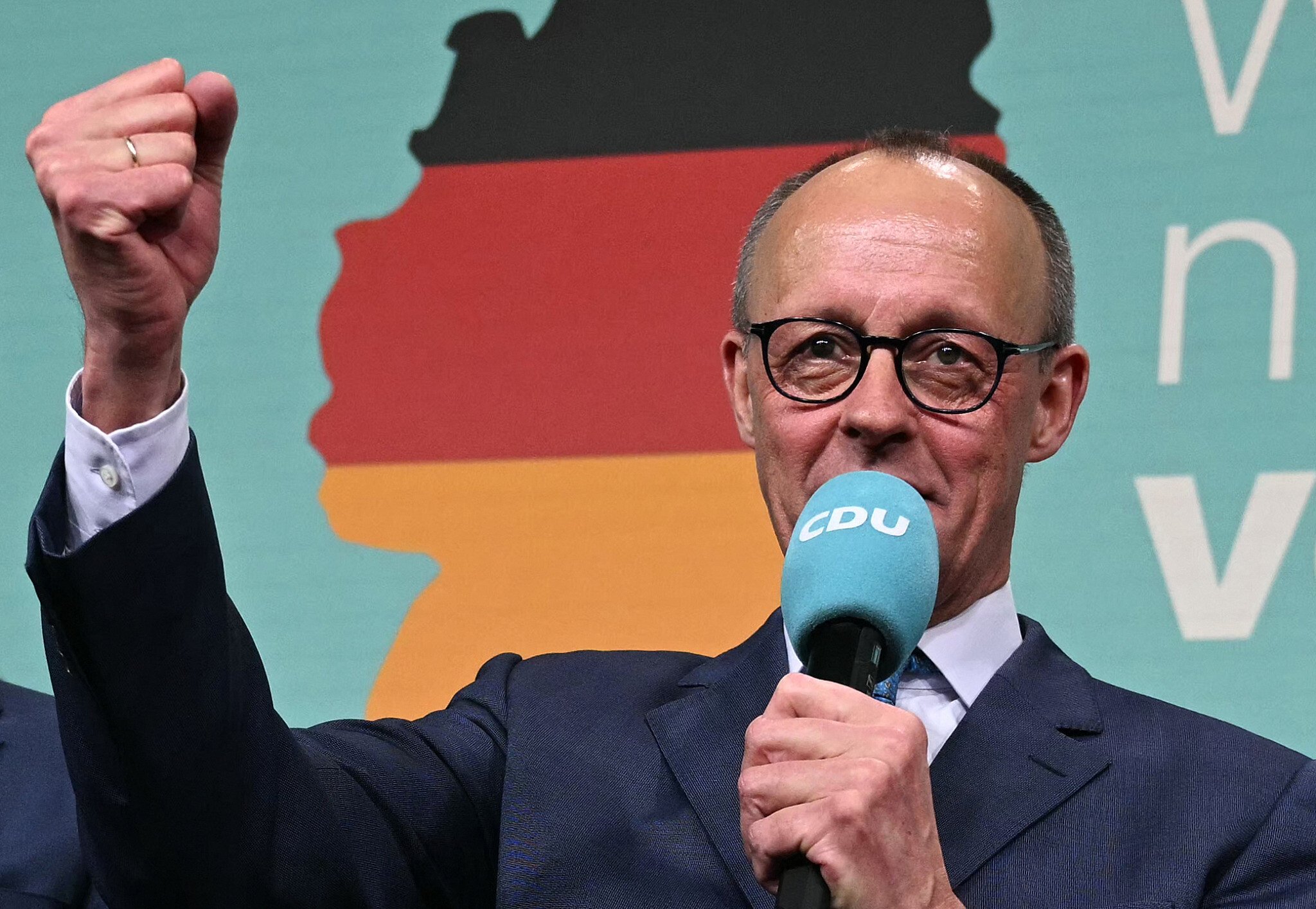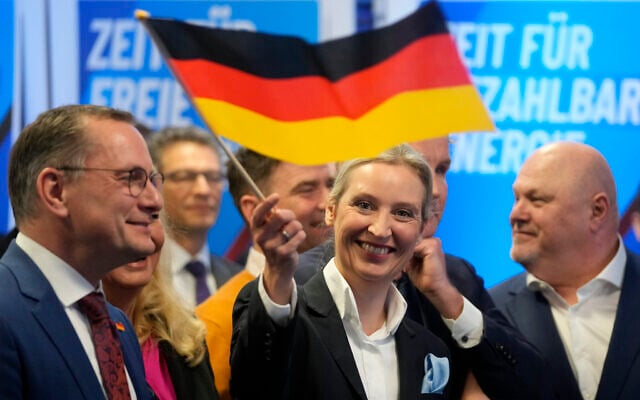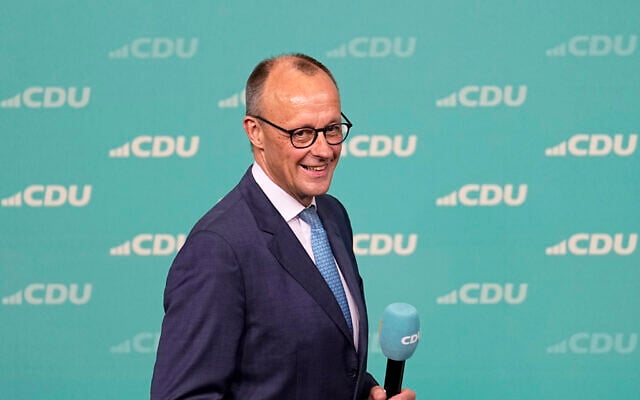



BERLIN, Germany (AFP) — Germany’s conservatives swept to victory in Sunday’s elections, with their leader Friedrich Merz set to become the next chancellor, followed by the far-right AfD in second place with record gains, in the strongest showing for a far-right party since World War II.
Merz urged the speedy formation of a new coalition government, warning that as US President Donald Trump is driving rapid and disruptive changes, “the world isn’t waiting for us.”
He stressed that — after Trump reached out to Russia and made comments fuelling doubts about the future strength of NATO — Europe must boost its defense capabilities and said that he has “no illusions at all about what is coming out of America.”
The far-right Alternative for Germany (AfD) almost doubled its score to over 20 percent, boosted by fears over immigration and security after a spate of deadly attacks blamed on asylum seekers.
Merz’s CDU/CSU alliance won more than 28 percent, according to projections at 2000 GMT, crushing the Social Democrats (SPD) of outgoing Chancellor Olaf Scholz, which were looking at a historic low of 16 percent.
Merz — a long-time party rival of ex-chancellor Angela Merkel — has vowed a crackdown on irregular immigration. He hopes to win back votes from the AfD whose rise has stunned many in a country still seeking to atone for its dark Nazi history.
For now, the AfD, basking in the vocal support of key Trump allies, is set to stay in opposition. All other parties have vowed to keep it out of power and behind a “firewall” of non-cooperation.
But its jubilant leader Alice Weidel hailed the “historic” result and again said her party was ready to govern with the CDU/CSU.
“Our hand remains outstretched to form a government,” Weidel told supporters, adding “next time we’ll come first.”
“I am very afraid of this shift to the right,” said retired teacher Hilke Reichersdorfer, 71, wearing a red scarf outside SPD headquarters. She voiced fears of a situation “like in other European countries or in America.”
Before Merz, 69, takes over, he will have to forge a new coalition government in Europe’s top economy, an often drawn-out process he has vowed to complete by Easter.
This threatens to leave Berlin paralyzed for weeks to come as Trump has forced head-spinning change and rattled European allies, especially over the Ukraine war.
The German election came amid tectonic upheaval in US-Europe ties sparked by Trump going over the heads of European leaders to make a direct outreach to Russian President Vladimir Putin to end the three-year-old Ukraine war, which began with the February 2022 Russian invasion of Ukraine.
“After Donald Trump’s statements in the last week it is clear that the Americans are largely indifferent to the fate of Europe,” said Merz, hitherto seen as an Atlanticist, in a post-election TV debate.
Merz’s broadside against the US came despite Trump welcoming the election outcome with a post on his Truth Social.
“Much like the USA, the people of Germany got tired of the no common sense agenda, especially on energy and immigration, that has prevailed for so many years,” Trump wrote.
Merz said his “absolute priority will be to strengthen Europe as quickly as possible so that, step by step, we can really achieve independence from the USA step by step.”
He even ventured to ask whether the next summit of the North Atlantic Treaty Organisation, which has underpinned Europe’s security for decades, would still see “NATO in its current form.”
To build a majority, Merz may first reach out to the SPD, though without Scholz, who apologized for his party’s “bitter” defeat.
Merz could also approach the Greens, who scored 12 percent, although the CDU’s Bavarian sister party the CSU has so far rejected this.
Another potential partner, the small FDP — which sparked the November breakup of Scholz’s government — stared down the barrel of narrowly missing the five-percent hurdle to return to parliament.
This would impact the complex parliamentary arithmetic, as would the fate of the far-left BSW, which was just below the threshold late Sunday, at 4.9 percent.
If the BSW eventually scrapes in, this will mean Merz needs two coalition allies — raising the specter of yet another ideologically diverse alliance, like the failed alliance that was led by Scholz.
In a strange twist to the polarised campaign, the AfD has basked in the support of Team Trump, which saw billionaire Elon Musk praising it as the only party that can “save Germany.”
Merz said “the interventions from Washington were no less dramatic and impertinent than the interventions we have seen from Moscow, so we are under massive pressure from two sides.”
The AfD, strongest in the ex-communist east, also made gains in western states for its best-ever result after Germany was shocked by a series of deadly attacks blamed on migrants.
In December a car ramming through a Christmas market crowd killed six people and wounded hundreds.
A stabbing spree targeting kindergarten children followed, then another car-ramming attack, in Munich, and a knife attack at Berlin’s Holocaust memorial just last weekend.
Merz has argued that the next government must boldly address the AfD’s concerns on migration and also fix the ailing economy, warning that otherwise the far right might win next time around.
“The stakes could not be higher,” argued political analyst and author Michael Broening.
“Germany’s mainstream parties have consistently failed to convince voters to reject the far right, and this election could be their last chance to turn the tide.”
Democratic forces must find solutions to the country’s problems, he added. “If Germany’s ‘establishment’ parties fail to deliver this time, they may not be the establishment for much longer.”
Reuters contributed to this report.



